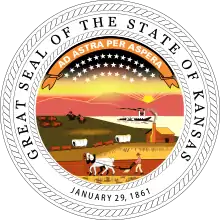Lincoln County, Kansas
Lincoln County (standard abbreviation: LC) is a county located in the U.S. state of Kansas. As of the 2010 census, the county population was 3,241.[2] The largest city and county seat is Lincoln Center.[3]
Lincoln County | |
|---|---|
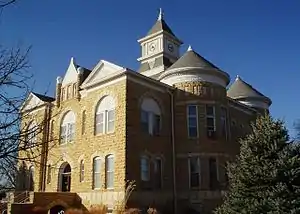 Lincoln County Courthouse in Lincoln (2005) | |
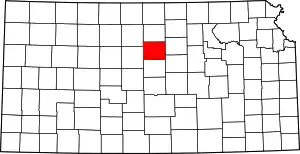 Location within the U.S. state of Kansas | |
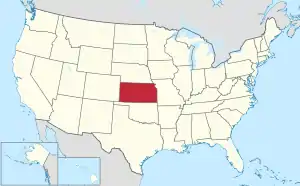 Kansas's location within the U.S. | |
| Coordinates: 39°03′N 98°12′W | |
| Country | |
| State | |
| Founded | February 26, 1867 |
| Named for | Abraham Lincoln[1] |
| Seat | Lincoln |
| Largest city | Lincoln |
| Area | |
| • Total | 720 sq mi (1,900 km2) |
| • Land | 719 sq mi (1,860 km2) |
| • Water | 1.1 sq mi (3 km2) 0.1%% |
| Population | |
| • Estimate (2018) | 3,023 |
| • Density | 4.5/sq mi (1.7/km2) |
| Time zone | UTC−6 (Central) |
| • Summer (DST) | UTC−5 (CDT) |
| Congressional district | 1st |
| Website | lincolncoks.com |

History
Early history
For many millennia, the Great Plains of North America was inhabited by nomadic Native Americans. From the 16th century to 18th century, the Kingdom of France claimed ownership of large parts of North America. In 1762, after the French and Indian War, France secretly ceded New France to Spain, per the Treaty of Fontainebleau.
19th century
In 1802, Spain returned most of the land to France, but keeping title to about 7,500 square miles. In 1803, most of the land for modern day Kansas was acquired by the United States from France as part of the 828,000 square mile Louisiana Purchase for 2.83 cents per acre.
In 1854, the Kansas Territory was organized, then in 1861 Kansas became the 34th U.S. state. In 1867, Lincoln County was established.
Geography
According to the U.S. Census Bureau, the county has a total area of 720 square miles (1,900 km2), of which 719 square miles (1,860 km2) is land and 1.1 square miles (2.8 km2) (0.1%) is water.[4]
Adjacent counties
- Mitchell County (north)
- Ottawa County (east)
- Saline County (southeast)
- Ellsworth County (south)
- Russell County (west)
- Osborne County (northwest)
Demographics
| Historical population | |||
|---|---|---|---|
| Census | Pop. | %± | |
| 1870 | 516 | — | |
| 1880 | 8,582 | 1,563.2% | |
| 1890 | 9,709 | 13.1% | |
| 1900 | 9,886 | 1.8% | |
| 1910 | 10,142 | 2.6% | |
| 1920 | 9,894 | −2.4% | |
| 1930 | 9,707 | −1.9% | |
| 1940 | 8,338 | −14.1% | |
| 1950 | 6,643 | −20.3% | |
| 1960 | 5,556 | −16.4% | |
| 1970 | 4,582 | −17.5% | |
| 1980 | 4,145 | −9.5% | |
| 1990 | 3,653 | −11.9% | |
| 2000 | 3,578 | −2.1% | |
| 2010 | 3,241 | −9.4% | |
| 2018 (est.) | 3,023 | [5] | −6.7% |
| U.S. Decennial Census[6] 1790-1960[7] 1900-1990[8] 1990-2000[9] 2010-2016[2] | |||
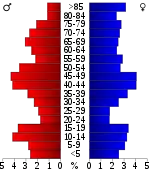
As of the census[10] of 2000, there were 3,578 people, 1,529 households, and 1,039 families residing in the county. The population density was 5 people per square mile (2/km2). There were 1,853 housing units at an average density of 3 per square mile (1/km2). The racial makeup of the county was 98.30% White, 0.11% Black or African American, 0.48% Native American, 0.11% Asian, 0.25% from other races, and 0.75% from two or more races. 1.03% of the population were Hispanic or Latino of any race.
There were 1,529 households, out of which 27.10% had children under the age of 18 living with them, 58.10% were married couples living together, 6.40% had a female householder with no husband present, and 32.00% were non-families. 29.60% of all households were made up of individuals, and 16.40% had someone living alone who was 65 years of age or older. The average household size was 2.29 and the average family size was 2.81.
In the county, the population was spread out, with 23.50% under the age of 18, 5.50% from 18 to 24, 22.90% from 25 to 44, 24.60% from 45 to 64, and 23.50% who were 65 years of age or older. The median age was 44 years. For every 100 females there were 96.20 males. For every 100 females age 18 and over, there were 92.40 males.
The median income for a household in the county was $30,893, and the median income for a family was $36,538. Males had a median income of $24,681 versus $20,000 for females. The per capita income for the county was $15,788. About 7.30% of families and 9.70% of the population were below the poverty line, including 11.70% of those under age 18 and 10.00% of those age 65 or over.
Government
Presidential elections
Lincoln county is heavily republican. Lyndon B. Johnson was the last Democrat to lose the county by less than 5%, and the last democrat to win the county was Franklin D. Roosevelt back in 1936.
| Year | Republican | Democratic | Third Parties |
|---|---|---|---|
| 2016 | 80.5% 1,179 | 14.7% 215 | 4.8% 70 |
| 2012 | 78.6% 1,165 | 19.5% 289 | 2.0% 29 |
| 2008 | 75.9% 1,204 | 21.9% 347 | 2.2% 35 |
| 2004 | 76.0% 1,368 | 21.7% 391 | 2.3% 41 |
| 2000 | 68.5% 1,295 | 24.8% 469 | 6.7% 126 |
| 1996 | 64.5% 1,372 | 24.8% 528 | 10.7% 228 |
| 1992 | 41.1% 893 | 28.2% 612 | 30.7% 667 |
| 1988 | 59.7% 1,229 | 38.6% 796 | 1.7% 35 |
| 1984 | 75.1% 1,723 | 24.0% 551 | 0.8% 19 |
| 1980 | 72.2% 1,685 | 22.6% 528 | 5.2% 122 |
| 1976 | 54.5% 1,225 | 43.8% 985 | 1.7% 37 |
| 1972 | 75.6% 1,649 | 21.8% 476 | 2.6% 57 |
| 1968 | 68.2% 1,721 | 23.1% 583 | 8.8% 221 |
| 1964 | 50.8% 1,373 | 48.7% 1,316 | 0.5% 14 |
| 1960 | 71.2% 2,052 | 28.5% 822 | 0.4% 10 |
| 1956 | 76.2% 2,219 | 23.4% 681 | 0.4% 12 |
| 1952 | 84.6% 2,841 | 15.1% 507 | 0.3% 9 |
| 1948 | 65.7% 2,181 | 33.0% 1,094 | 1.3% 43 |
| 1944 | 72.0% 2,405 | 27.3% 910 | 0.7% 24 |
| 1940 | 67.7% 2,822 | 31.2% 1,301 | 1.1% 46 |
| 1936 | 47.4% 2,001 | 52.4% 2,209 | 0.2% 10 |
| 1932 | 40.8% 1,653 | 56.7% 2,297 | 2.5% 101 |
| 1928 | 73.1% 2,655 | 26.3% 953 | 0.6% 23 |
| 1924 | 59.4% 2,277 | 16.0% 615 | 24.6% 941 |
| 1920 | 69.5% 2,298 | 28.3% 935 | 2.2% 73 |
| 1916 | 43.6% 1,716 | 53.5% 2,106 | 3.0% 118 |
| 1912 | 15.7% 381 | 44.9% 1,091 | 39.4% 956 |
| 1908 | 50.3% 1,218 | 46.1% 1,117 | 3.6% 88 |
| 1904 | 67.9% 1,516 | 27.4% 613 | 4.7% 105 |
| 1900 | 46.4% 1,110 | 52.3% 1,250 | 1.3% 30 |
| 1896 | 35.9% 787 | 63.2% 1,385 | 1.0% 21 |
| 1892 | 39.2% 878 | 60.9% 1,363 | |
| 1888 | 50.2% 1,069 | 29.0% 617 | 20.8% 444 |
Laws
Following amendment to the Kansas Constitution in 1986, the county remained a prohibition, or "dry", county until 1990, when voters approved the sale of alcoholic liquor by the individual drink with a 30% food sales requirement.[12]
Education
Unified school districts
Communities
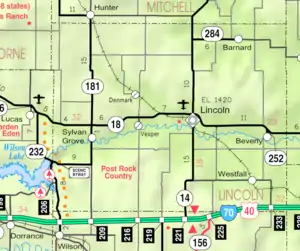
Cities
Townships
Lincoln County is divided into twenty townships. None of the cities within the county are considered governmentally independent, and all figures for the townships include those of the cities. In the following table, the population center is the largest city (or cities) included in that township's population total, if it is of a significant size.
| Township | FIPS | Population center |
Population | Population density /km2 (/sq mi) |
Land area km2 (sq mi) | Water area km2 (sq mi) | Water % | Geographic coordinates |
|---|---|---|---|---|---|---|---|---|
| Battle Creek | 04525 | 51 | 1 (1) | 93 (36) | 0 (0) | 0.37% | 39°10′7″N 98°13′9″W | |
| Beaver | 05075 | 454 | 5 (13) | 93 (36) | 0 (0) | 0.03% | 39°4′12″N 98°8′48″W | |
| Cedron | 11500 | 47 | 1 (1) | 94 (36) | 0 (0) | 0.08% | 39°10′34″N 98°25′57″W | |
| Colorado | 15000 | 340 | 4 (9) | 93 (36) | 0 (0) | 0.02% | 39°0′52″N 97°58′57″W | |
| Elkhorn | 20375 | 927 | 10 (26) | 93 (36) | 0 (0) | 0.02% | 39°1′36″N 98°7′10″W | |
| Franklin | 24425 | 80 | 1 (2) | 93 (36) | 0 (0) | 0.17% | 38°55′47″N 98°5′44″W | |
| Golden Belt | 26800 | 67 | 1 (2) | 93 (36) | 0 (0) | 0.07% | 38°55′30″N 98°18′32″W | |
| Grant | 27750 | 91 | 1 (3) | 94 (36) | 0 (0) | 0.03% | 39°5′21″N 98°18′58″W | |
| Hanover | 29850 | 43 | 0 (1) | 93 (36) | 0 (0) | 0.10% | 39°5′45″N 98°25′11″W | |
| Highland | 31950 | 65 | 1 (2) | 92 (36) | 1 (0) | 0.64% | 38°54′45″N 98°26′27″W | |
| Indiana | 34025 | 206 | 2 (6) | 93 (36) | 0 (0) | 0.06% | 39°0′31″N 98°11′52″W | |
| Logan | 41925 | 67 | 1 (2) | 92 (36) | 0 (0) | 0.33% | 39°4′31″N 97°58′14″W | |
| Madison | 44100 | 96 | 1 (3) | 92 (36) | 0 (0) | 0.35% | 38°54′40″N 97°59′27″W | |
| Marion | 44725 | 103 | 1 (3) | 92 (35) | 0 (0) | 0.10% | 39°4′27″N 98°13′8″W | |
| Orange | 52950 | 68 | 1 (2) | 93 (36) | 0 (0) | 0.14% | 39°10′7″N 98°19′51″W | |
| Pleasant | 56275 | 482 | 5 (13) | 93 (36) | 0 (0) | 0.01% | 39°0′13″N 98°25′13″W | |
| Salt Creek | 62800 | 61 | 1 (2) | 93 (36) | 0 (0) | 0.04% | 39°11′6″N 97°59′36″W | |
| Scott | 63525 | 158 | 2 (4) | 93 (36) | 0 (0) | 0.12% | 39°10′51″N 98°4′11″W | |
| Valley | 72900 | 69 | 1 (2) | 93 (36) | 0 (0) | 0.26% | 38°56′10″N 98°12′45″W | |
| Vesper | 73650 | 103 | 1 (3) | 95 (37) | 0 (0) | 0.04% | 39°0′13″N 98°17′49″W |
See also
|
|
References
- Gannett, Henry (1905). The Origin of Certain Place Names in the United States. U.S. Government Printing Office. p. 187.
- "State & County QuickFacts". United States Census Bureau. Archived from the original on August 6, 2011. Retrieved July 26, 2014.
- "Find a County". National Association of Counties. Retrieved 2011-06-07.
- "US Gazetteer files: 2010, 2000, and 1990". United States Census Bureau. 2011-02-12. Retrieved 2011-04-23.
- "Population and Housing Unit Estimates". Retrieved December 23, 2019.
- "U.S. Decennial Census". United States Census Bureau. Retrieved July 26, 2014.
- "Historical Census Browser". University of Virginia Library. Retrieved July 26, 2014.
- "Population of Counties by Decennial Census: 1900 to 1990". United States Census Bureau. Retrieved July 26, 2014.
- "Census 2000 PHC-T-4. Ranking Tables for Counties: 1990 and 2000" (PDF). United States Census Bureau. Retrieved July 26, 2014.
- "U.S. Census website". United States Census Bureau. Retrieved 2008-01-31.
- http://uselectionatlas.org/RESULTS
- "Map of Wet and Dry Counties". Alcoholic Beverage Control, Kansas Department of Revenue. November 2006. Archived from the original on 2007-10-08. Retrieved 2007-12-26.
Further reading
- Elizabeth N. Barr (1908), A souvenir history of Lincoln County, Kansas, Topeka, Kansas: Farmer Job Office, OCLC 3156144, OL 6598605M; 123 pages.
- Standard Atlas of Lincoln County, Kansas; Geo. A. Ogle & Co; 72 pages; 1918.
- Plat Book of Lincoln County, Kansas; North West Publishing Co; 39 pages; 1901.
